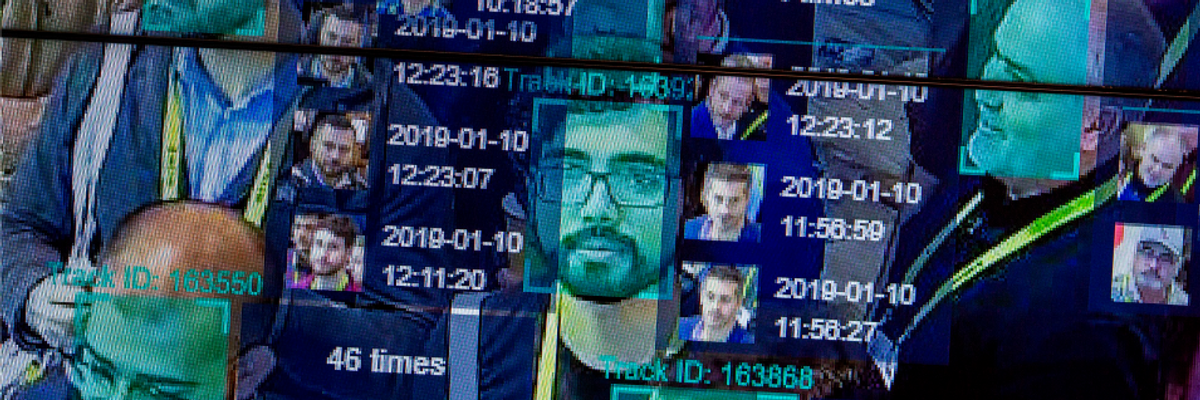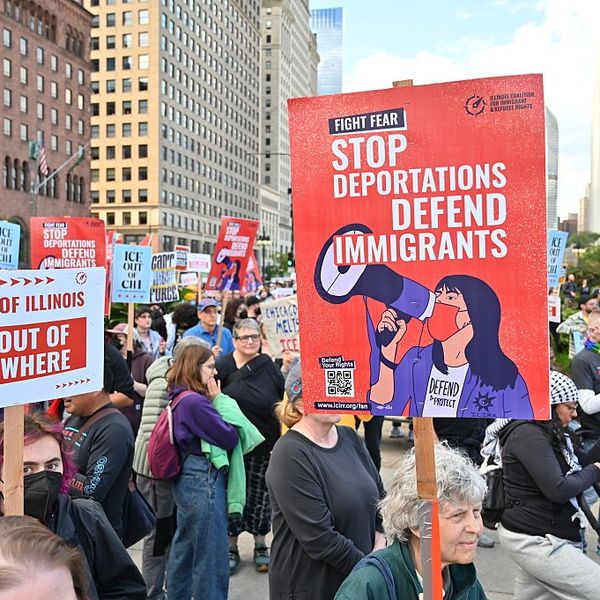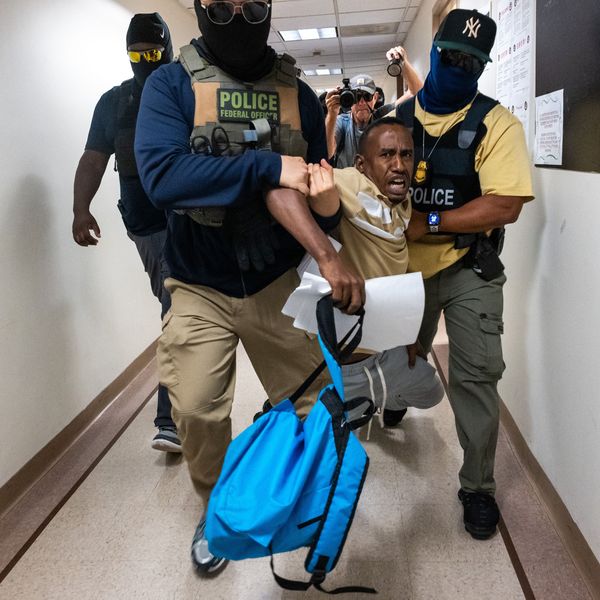
A live demonstration uses artificial intelligence and facial recognition in dense crowd spatial-temporal technology at the Horizon Robotics exhibit at the Las Vegas Convention Center during CES 2019 in Las Vegas on January 10, 2019. (Photo: David McNew/AFP/Getty Images)
30+ Rights Groups Launch Campaign Demanding Law Enforcement Ban on 'Authoritarian and Invasive' Facial Recognition Technology
"We need to ban this technology outright, treat it like biological or nuclear weapons, and prevent it from proliferating before it's too late."
A diverse coalition of advocacy groups representing more than 15 million people launched a grassroots pressure campaign Thursday calling on local, state, and federal lawmakers to completely ban law enforcement use of facial recognition technology, which the organizations warn is "spreading like an epidemic" and poses a dire threat to fundamental privacy rights.
"Facial recognition is one of the most authoritarian and invasive forms of surveillance ever created," said Evan Greer, deputy director of Fight for the Future (FFTF), which is leading the campaign. "No amount of regulation can fix the dangers inherent in this form of Big Brother automaton. We need to ban this technology outright, treat it like biological or nuclear weapons, and prevent it from proliferating before it's too late."
"We know this technology will expand the reach of the surveillance state while also causing more harm to already vulnerable communities."
--Myaisha Hayes, MediaJustice
According to FFTF, opposition to facial recognition technology is "reaching a boiling point" as over 30 major organizations have backed the new campaign, including United We Dream, Greenpeace USA, RootsAction, and Color of Change.
The organizations plan to flood lawmakers with letters and calls demanding nothing less than a total ban on law enforcement use of facial recognition technology, which is increasingly being put to use by government agencies at major U.S. airports and elsewhere across the nation.
Myaisha Hayes, national organizer on criminal justice and tech at MediaJustice, another group backing the campaign, said in a statement that facial recognition technology disproportionately violates the rights of minority communities.
"Given the history of racist and discriminatory policing, coupled with the horrific deportations we are currently witnessing under this administration," said Hayes, "we know this technology will expand the reach of the surveillance state while also causing more harm to already vulnerable communities."
Echoing Hayes, United We Dream strategy director Adrian Reyna warned use of facial recognition technology by police and border agents puts immigrants in harm's way.
"The Trump administration is carrying out the mass deportation and detention of immigrants," said Reyna. "We have already seen the impact of police and the deportation force unleashed--they are abducting people in their workplaces, in their homes, and keeping entire families in detention indefinitely. Equipping them with facial recognition technology will certainly lead to more raids and further stoke fear among Black and brown communities.
"The use of this equipment is immoral and destructive," Reyna added. "It must be banned nationwide."
The grassroots campaign comes as facial recognition is garnering growing attention at the national level, with Congress holding hearings on the topic and considering bipartisan legislation to limit use of the technology.
Last month, as Common Dreams reported, Sen. Bernie Sanders (I-Vt.) became the first 2020 Democratic presidential candidate to call for a ban on law enforcement use of facial recognition technology as part of his plan to overhaul the U.S. criminal justice system.
"The rapid spread of facial recognition surveillance is one of the most urgent threats to our basic freedom and human rights today," Greer said last month. "Every single 2020 candidate should be calling for a ban on this invasive, biased, and dangerous technology."
An Urgent Message From Our Co-Founder
Dear Common Dreams reader, The U.S. is on a fast track to authoritarianism like nothing I've ever seen. Meanwhile, corporate news outlets are utterly capitulating to Trump, twisting their coverage to avoid drawing his ire while lining up to stuff cash in his pockets. That's why I believe that Common Dreams is doing the best and most consequential reporting that we've ever done. Our small but mighty team is a progressive reporting powerhouse, covering the news every day that the corporate media never will. Our mission has always been simple: To inform. To inspire. And to ignite change for the common good. Now here's the key piece that I want all our readers to understand: None of this would be possible without your financial support. That's not just some fundraising cliche. It's the absolute and literal truth. We don't accept corporate advertising and never will. We don't have a paywall because we don't think people should be blocked from critical news based on their ability to pay. Everything we do is funded by the donations of readers like you. Will you donate now to help power the nonprofit, independent reporting of Common Dreams? Thank you for being a vital member of our community. Together, we can keep independent journalism alive when it’s needed most. - Craig Brown, Co-founder |
A diverse coalition of advocacy groups representing more than 15 million people launched a grassroots pressure campaign Thursday calling on local, state, and federal lawmakers to completely ban law enforcement use of facial recognition technology, which the organizations warn is "spreading like an epidemic" and poses a dire threat to fundamental privacy rights.
"Facial recognition is one of the most authoritarian and invasive forms of surveillance ever created," said Evan Greer, deputy director of Fight for the Future (FFTF), which is leading the campaign. "No amount of regulation can fix the dangers inherent in this form of Big Brother automaton. We need to ban this technology outright, treat it like biological or nuclear weapons, and prevent it from proliferating before it's too late."
"We know this technology will expand the reach of the surveillance state while also causing more harm to already vulnerable communities."
--Myaisha Hayes, MediaJustice
According to FFTF, opposition to facial recognition technology is "reaching a boiling point" as over 30 major organizations have backed the new campaign, including United We Dream, Greenpeace USA, RootsAction, and Color of Change.
The organizations plan to flood lawmakers with letters and calls demanding nothing less than a total ban on law enforcement use of facial recognition technology, which is increasingly being put to use by government agencies at major U.S. airports and elsewhere across the nation.
Myaisha Hayes, national organizer on criminal justice and tech at MediaJustice, another group backing the campaign, said in a statement that facial recognition technology disproportionately violates the rights of minority communities.
"Given the history of racist and discriminatory policing, coupled with the horrific deportations we are currently witnessing under this administration," said Hayes, "we know this technology will expand the reach of the surveillance state while also causing more harm to already vulnerable communities."
Echoing Hayes, United We Dream strategy director Adrian Reyna warned use of facial recognition technology by police and border agents puts immigrants in harm's way.
"The Trump administration is carrying out the mass deportation and detention of immigrants," said Reyna. "We have already seen the impact of police and the deportation force unleashed--they are abducting people in their workplaces, in their homes, and keeping entire families in detention indefinitely. Equipping them with facial recognition technology will certainly lead to more raids and further stoke fear among Black and brown communities.
"The use of this equipment is immoral and destructive," Reyna added. "It must be banned nationwide."
The grassroots campaign comes as facial recognition is garnering growing attention at the national level, with Congress holding hearings on the topic and considering bipartisan legislation to limit use of the technology.
Last month, as Common Dreams reported, Sen. Bernie Sanders (I-Vt.) became the first 2020 Democratic presidential candidate to call for a ban on law enforcement use of facial recognition technology as part of his plan to overhaul the U.S. criminal justice system.
"The rapid spread of facial recognition surveillance is one of the most urgent threats to our basic freedom and human rights today," Greer said last month. "Every single 2020 candidate should be calling for a ban on this invasive, biased, and dangerous technology."
A diverse coalition of advocacy groups representing more than 15 million people launched a grassroots pressure campaign Thursday calling on local, state, and federal lawmakers to completely ban law enforcement use of facial recognition technology, which the organizations warn is "spreading like an epidemic" and poses a dire threat to fundamental privacy rights.
"Facial recognition is one of the most authoritarian and invasive forms of surveillance ever created," said Evan Greer, deputy director of Fight for the Future (FFTF), which is leading the campaign. "No amount of regulation can fix the dangers inherent in this form of Big Brother automaton. We need to ban this technology outright, treat it like biological or nuclear weapons, and prevent it from proliferating before it's too late."
"We know this technology will expand the reach of the surveillance state while also causing more harm to already vulnerable communities."
--Myaisha Hayes, MediaJustice
According to FFTF, opposition to facial recognition technology is "reaching a boiling point" as over 30 major organizations have backed the new campaign, including United We Dream, Greenpeace USA, RootsAction, and Color of Change.
The organizations plan to flood lawmakers with letters and calls demanding nothing less than a total ban on law enforcement use of facial recognition technology, which is increasingly being put to use by government agencies at major U.S. airports and elsewhere across the nation.
Myaisha Hayes, national organizer on criminal justice and tech at MediaJustice, another group backing the campaign, said in a statement that facial recognition technology disproportionately violates the rights of minority communities.
"Given the history of racist and discriminatory policing, coupled with the horrific deportations we are currently witnessing under this administration," said Hayes, "we know this technology will expand the reach of the surveillance state while also causing more harm to already vulnerable communities."
Echoing Hayes, United We Dream strategy director Adrian Reyna warned use of facial recognition technology by police and border agents puts immigrants in harm's way.
"The Trump administration is carrying out the mass deportation and detention of immigrants," said Reyna. "We have already seen the impact of police and the deportation force unleashed--they are abducting people in their workplaces, in their homes, and keeping entire families in detention indefinitely. Equipping them with facial recognition technology will certainly lead to more raids and further stoke fear among Black and brown communities.
"The use of this equipment is immoral and destructive," Reyna added. "It must be banned nationwide."
The grassroots campaign comes as facial recognition is garnering growing attention at the national level, with Congress holding hearings on the topic and considering bipartisan legislation to limit use of the technology.
Last month, as Common Dreams reported, Sen. Bernie Sanders (I-Vt.) became the first 2020 Democratic presidential candidate to call for a ban on law enforcement use of facial recognition technology as part of his plan to overhaul the U.S. criminal justice system.
"The rapid spread of facial recognition surveillance is one of the most urgent threats to our basic freedom and human rights today," Greer said last month. "Every single 2020 candidate should be calling for a ban on this invasive, biased, and dangerous technology."

